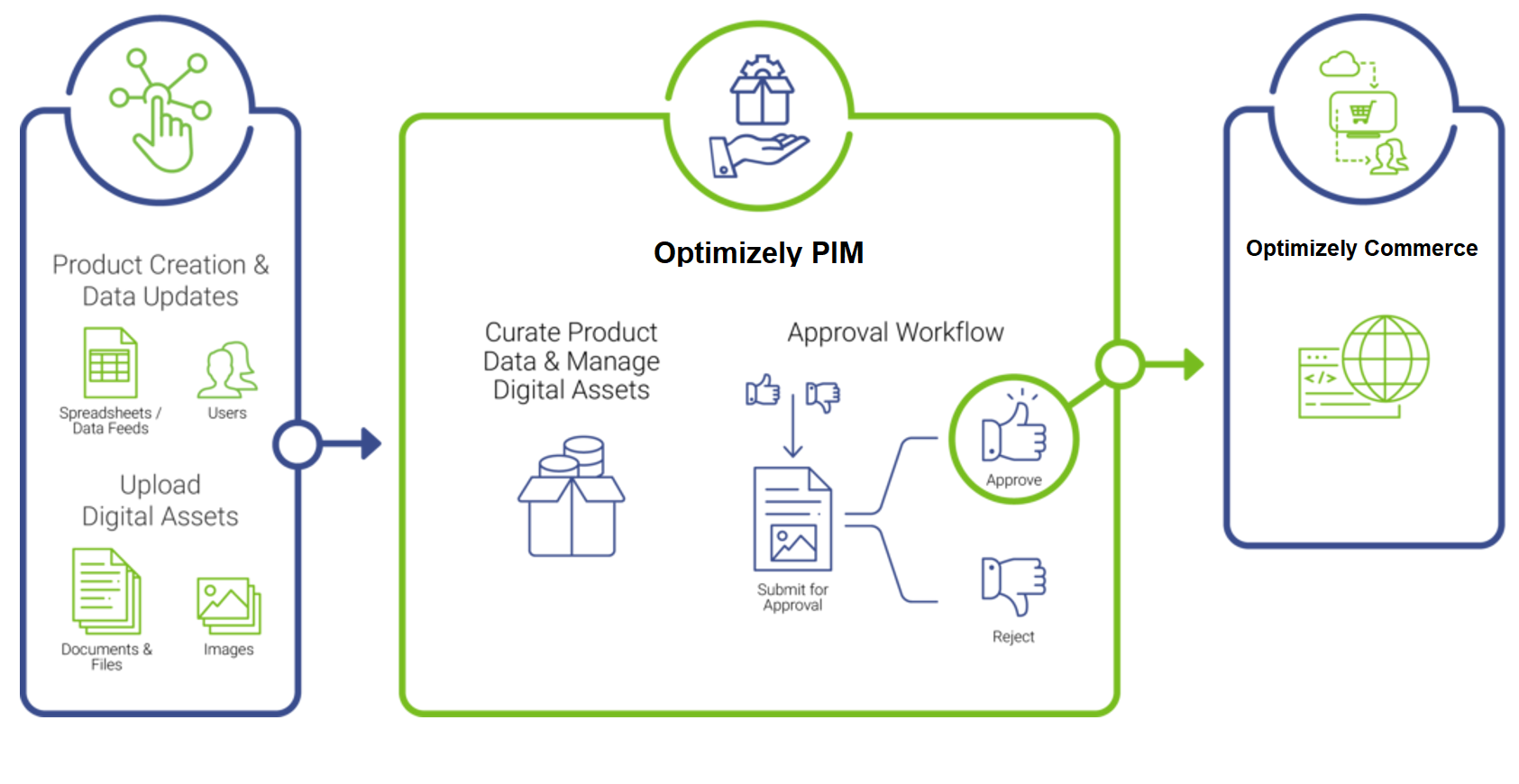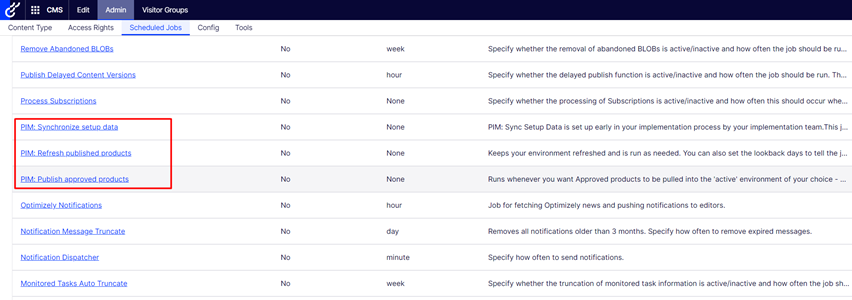Commerce Connect + PIM
Install and configure Optimizely Product Information Management for Optimizely Commerce Connect.
With the Optimizely Product Information Management (PIM) integration, you can manage detailed product information in the PIM and sync product data to Optimizely Commerce Connect.
Note
• Commerce Connect dependency: version 14.0.0 and higher.
• EPiServer.Commerce.PIM: version 1.0.0 and higher.
• The current integration is a beta version
About Optimizely PIM
Optimizely Product Information Management (PIM) manages detailed product information such as size, weight, color, and associated images. You can set up the catalog and product data requirements and manage the data acquisition and curation process.
Integration contains a set of scheduled jobs to sync the information with Optimizely Commerce Connect system overview.

Install and configure
Add the PIM integration by installing the EPiServer.Commerce.PIM NuGet package to your Optimizely Commerce site. The integration package contains the EPiServer.Commerce.PIM integration project, including a set of scheduled jobs for data sync.
Configuration settings
After installing the package, add the following configuration settings to the Commerce Connect attribute in the appSettings.json file and define values as described in the following example.
Commerce: {
"PIMOptions": {
"Environment": "",
"AppKey": "",
"SecretKey": "",
"NumberOfLookbackDays": "",
"APIAddress": ""
}
}
Configuration keys
| Key | Description |
Environment | Values: Production or Sandbox. Setting for current site environment. This must match the setting in PIM > Configure > Settings > Active Publishing Environment. |
AppKey | The application key (instance key) to connect to PIM API. |
SecretKey | The secret key (instance secret ) to connect PIM API. |
NumberOfLookbackDays | Number of days used in Refresh mode to get product records based on the published date. The default value is five days. |
APIAddress | Root URL of PIM API endpoint. The default value is <https://pim.insitecloud.net/> |
Scheduled jobs
The PIM integration package contains a set of scheduled jobs for managing data synchronization with Commerce Connect. Scheduled jobs are managed from the CMS Admin view.
Synchronize setup data
PIM: Synchronize setup data is set up early in the implementation process by the implementation team. You should run the job at initiation to pull in languages, websites, product relationships, and product custom properties. Run the job from a Sandbox or Production instance, not a partner QA site, and run the job when catalogs, languages, metaclasses, meta-fields, or relationship types (AssociationGroupDefinition) are added or updated.
Note
- The catalogs in Commerce Connect site will be synced to the PIM as websites. After the PIM: Synchronize setup data job is finished, you can map the PIM category tree to one website (Catalog) to integrate with Commerce Connect. If you select more than one website, an error occurs when you run the PIM: Publish approved products job.
- The catalog data (categories, products, and variants) synchronization occurs only from PIM to Commerce Connect. So if you try to create catalog data (categories, products, and variants) outside of PIM, it is discarded after you run "PIM: Publish approved products" job.
Publish approved products
The PIM: Publish approved products job runs whenever you want Approved products to be pulled into the active environment of your choice – Sandbox (early in the project) or Production (once live). It pulls in products with the status Approved and then updates the status in the PIM to Published. You can set the job to recur or run it on-demand.
Refresh published products
The PIM: Refresh published products job keeps non-production environments synced with the PIM as needed. It uses the lookback days parameter in the job to pull products with Published status, based on the date last published, into the environment from which you are running the job. You also can use this for development environments. It should typically only be run on demand.

Attributes
From EPiServer.Commerce.PIM version 1.0.0: NoSync and Sync can control the integration between the Commerce Connect and PIM instances.
| # | Attribute name | Applied on | Description |
| 1 | NoSync | Product or variant classes | It prevents a template class from being synchronized. |
| 2 | Sync | Properties in a product or variant class | Sync the property over to PIM. Fields marked with the Sync property will automatically be read-only inside Commerce Connect. |
If no attribute is to be used, the default behavior is that Product and Variant classes are synced, but the Properties of Product and Variant classes will not be synchronized.
NoSync attribute
Example with a variation template that will not be synced to the PIM.

Sync attribute
Example of 2 properties, FabricType property is being synchronized over, and WebsiteColor will not be synced. The synced FabricType property is required and translatable in the PIM.
Updated 3 months ago
